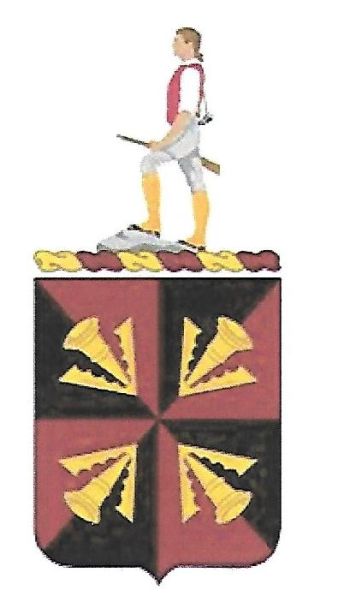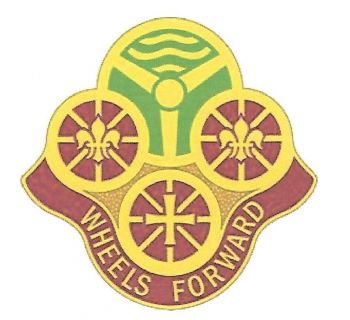484th Transportation Battalion, US Army
484TH TRANSPORTATION BATTALION, US ARMY
| (Coat of Arms) |
(Distinctive Unit Insignia) |
Official blazon
Shield: Gyronny of eight, Gules (Brick Red) and Sable, four pheons in saltire, points to center Or.
Crest: That for regiments and separated battalions of the Army Reserve: From a wreath Or and Gules, the Lexington Minute Man Proper. The Statue of the Minute Man, Captain John Parker (H.H. Kitson, sculptor), stands on the common in Lexington, Massachusetts.
Motto: Wheels forward.
Distinctive Unit Insignia, Description: A gold metal and enamel device 1 3/16 inches (3.02 cm) in height overaall consiting of a three-spoked gold steering wheel, vertical spoke to base with three horizontal wavy gold bars between the upper spokes all on a green area, surmounting the steering wheel lower lefterand right two eight-spoked gold wheels all conjoining another in base, each of the upper bearing a gold fleur-de-lis and the lower bearing a gold cross pattée all on a brick red area and all above a brick red scroll inscribed "WHEELS FORWARD" in gold letters.
Origin/meaning
The Colours are those of Transportation Units. The gyrons represents unity of purpose of the organization, while the pheons are symbolic of the dexterity and nimbleness of wit of personnel of the organization in the perfomance of their duties. The pheons, the eight gyrons, and the four quarters of the shield suggests the numerical designation of the Battlion.
The Coat of Arms was approved for the 784th Port Battalion on 23 February 1943. It was cancelled on 13 September 1976. The Coat of Arms was reinstated and redesignated for the 484th Transportation Battalion with the motto changed on 8 October 1996. The Distinctive Unit Insignia was approved on 29 December 1970.
Literature: The Institute of Heraldry, US Army

